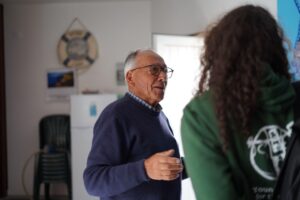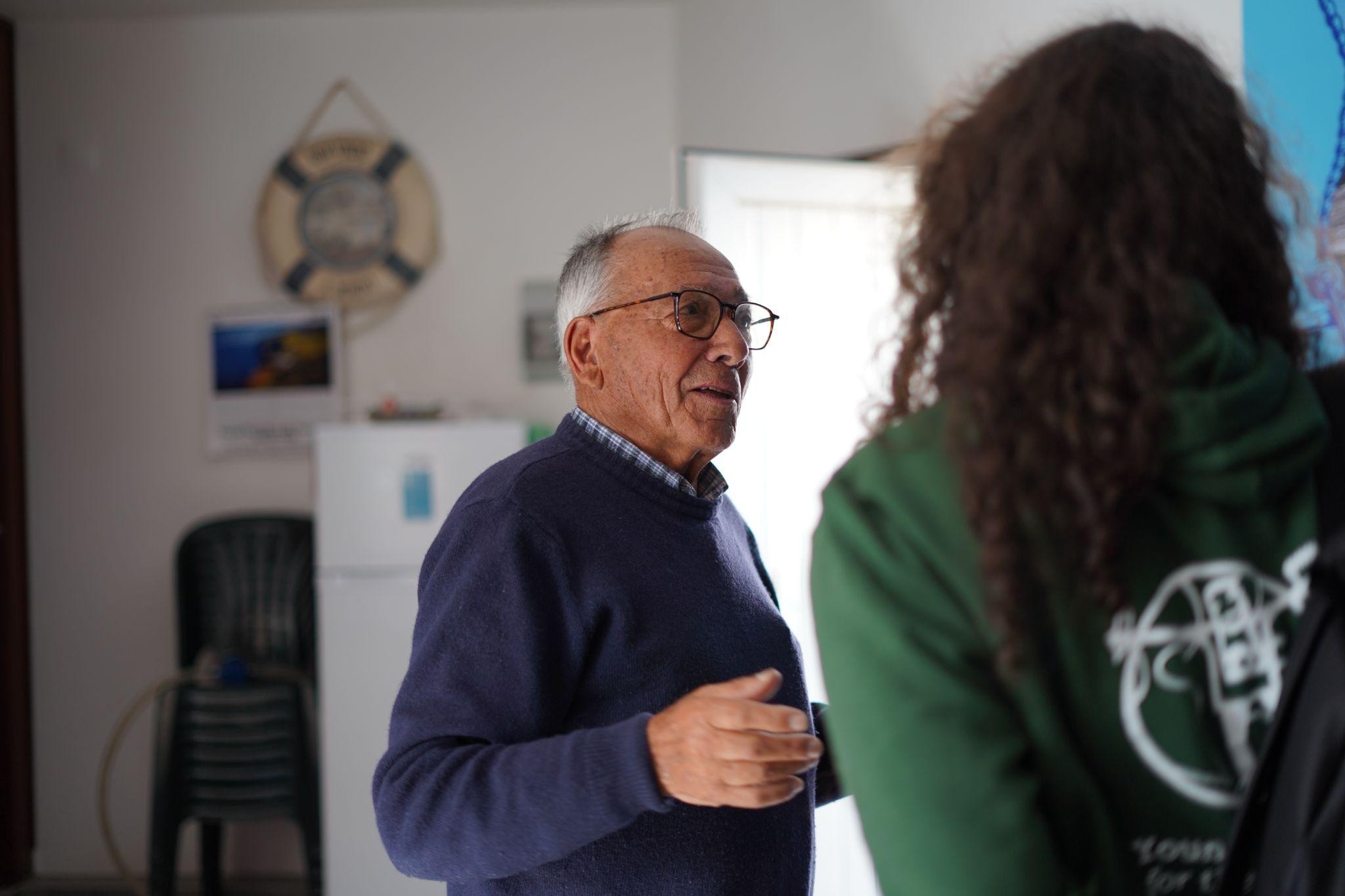
In Ribamar, life was woven with nets made by fishermen’s wives. Antunes recalls how a tradition began with lessons from Vila do Conde in 1964
Along the Atlantic coast, 70 km northwest of Lisbon, there is a small town referred to as Ribamar. Renowned for artisanal fishing, this parish is esteemed for its frequent catches of octopus, velvet crab, and gilt-head bream. In the “Porto Dinheiro” beach, we can find “Associação de desenvolvimento e apoio às pescas’, an association made up by fishermen that meet periodically to preserve Ribamar traditions and make legislation fairer for fishermen.
Lourenço Filipe Antunes, a self proclaimed man of the sea, who first set out on boats at just fourteen, has a lot to say: to change the current octopus catch weight limits; to end “alcatruzes”, plastic octopus traps that endanger their populations by ensnaring the eggs inside them; overfishing; the use of “redes de emalhar”, a type of passive fishing method that employs stationary nets; and coastal pollution.
Life in Ribamar has long been tied to nets, Antunes fondly remembers this traditional art made by the women of this town: “In 1964, two ladies from Vila do Conde came here to teach the fishermen’s wives how to make fishing nets. From then on, the men stayed at the sea and women made the nets. Some time later, they also started making polyethylene equipment”.
Polyethylene is a mass-produced plastic that is commonly used in fishing nets in the region, as it is cheap to produce. However, it has a significant impact on marine sustainability, as these nets have a short lifespan, often less than a year, and are not biodegradable. Transitioning to more sustainable materials is not an option for traditional businesses in Ribamar, given their financial capacity, which prevents them from implementing price increases without jeopardizing their customer base.
Fishermen like Lourenço are well aware of how pollution affects marine biodiversity. He advocates for clean beaches and has been noticing changes in ‘Porto Dinheiro’ over the past few years. He says fishermen keep each other in check, as the presence of plastic waste in the waters is detrimental beyond marine life, threatening the fishing boats that have long supported local families. Years of experience have translated into precious insight on ecosystem fragility. Ribamar fishermen have learned this lesson the hard way, as they saw their once prosperous lobster population dwindle significantly due to trawling fishing.
Lourenço aims to revive the crawfish nurseries, a practice once managed by local families as part of the region’s traditional fishing heritage. To this end, he has partnered with ecoMAR to bring the initiative back to life.
Fish conservation efforts in Ribamar are often hindered by the low profit margins faced by fishermen. The relationship between Portuguese legislation and Ribamar’s fishing community is complex. In the 1960s, the government introduced ‘Portaria 18113’ to make “lota” (fish auction) prices more accessible, but this law disproportionately harmed artisanal fishermen. Although several laws have since been passed to address this inequality, a 2023 report from the “Direção Geral de Recursos Naturais, Segurança e Serviços Marítimos” (DGRM) highlighted that Lisbon’s metropolitan area has the lowest fish prices per kilogram – 1,48€, compared to the national average of 2,27€ per kilo that year. This regional price disparity favors mass fishing over traditional artisanal practices like those in Ribamar.
Despite the challenges, Lourenço remains optimistic about the future. He believes tourism in Lourinhã can play a key role in raising awareness about local environmental issues while giving a voice to fishermen who have long felt overlooked. One of the area’s biggest attractions is the ‘Festa do Mar,’ held on the last weekend of July and the first weekend of August. The town of Ribamar sees this vibrant celebration as a way to bring an additional source of income to local communities who have relied on fishing for generations.
The clock keeps ticking, and for towns like Ribamar, the tides are shifting. As its people confront the challenges of the modern era, new opportunities come to shore.




You must be logged in to post a comment.